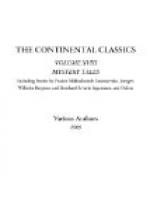Like all old people, in general, the Countess suffered from sleeplessness. Having undressed, she seated herself at the window in a Voltaire armchair, and dismissed her maids. The candles were taken away, and once more the room was left with only one lamp burning in it. The Countess sat there looking quite yellow, mumbling with her flaccid lips and swaying to and fro. Her dull eyes expressed complete vacancy of mind, and, looking at her, one would have thought that the rocking of her body was not a voluntary action of her own, but was produced by the action of some concealed galvanic mechanism.
Suddenly the death-like face assumed an inexplicable expression. The lips ceased to tremble, the eyes became animated: before the Countess stood an unknown man.
“Do not be alarmed, for Heaven’s sake, do not be alarmed!” said he in a low but distinct voice. “I have no intention of doing you any harm; I have only come to ask a favor of you.”
The old woman looked at him in silence, as if she had not heard what he had said. Hermann thought that she was deaf, and, bending down towards her ear, he repeated what he had said. The aged Countess remained silent as before.
“You can insure the happiness of my life,” continued Hermann, “and it will cost you nothing. I know that you can name three cards in order—”
Hermann stopped. The Countess appeared now to understand what he wanted; she seemed as if seeking for words to reply.
“It was a joke,” she replied at last. “I assure you it was only a joke.”
“There is no joking about the matter,” replied Hermann, angrily. “Remember Chaplitsky, whom you helped to win.”
The Countess became visibly uneasy. Her features expressed strong emotion, but they quickly resumed their former immobility.
“Can you not name me these three winning cards?” continued Hermann.
The Countess remained silent; Hermann continued:
“For whom are you preserving your secret? For your grandsons? They are rich enough without it, they do not know the worth of money. Your cards would be of no use to a spendthrift. He who cannot preserve his paternal inheritance will die in want, even though he had a demon at his service. I am not a man of that sort. I know the value of money. Your three cards will not be thrown away upon me. Come!”
He paused and tremblingly awaited her reply. The Countess remained silent. Hermann fell upon his knees.
“If your heart has ever known the feeling of love,” said he, “if you remember its rapture, if you have ever smiled at the cry of your new-born child, if any human feeling has ever entered into your breast, I entreat you by the feelings of a wife, a lover, a mother, by all that is most sacred in life, not to reject my prayer. Reveal to me your secret. Of what use is it to you? May be it is connected with some terrible sin, with the loss of eternal salvation, with some bargain with the devil. Reflect, you are old, you have not long to live—I am ready to take your sins upon my soul. Only reveal to me your secret. Remember that the happiness of a man is in your hands, that not only I, but my children and my grandchildren, will bless your memory and reverence you as a saint.”




